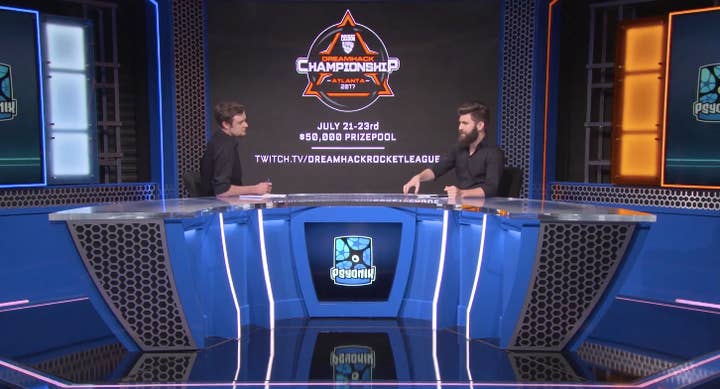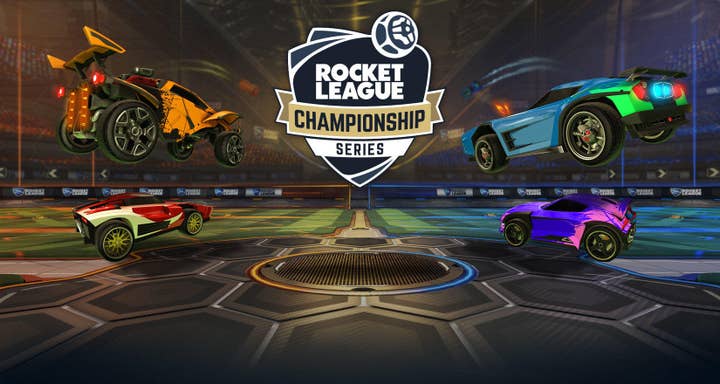How Rocket League is looking to shape the future of esports
Psyonix details its ambitious efforts to turn its car football game into a mainstream sport
The stories about esports going to the olympics, or airing on mainstream TV, are exciting.
In itself, these moments are not that important to the future of competitive gaming. This is a modern sport, there's no need for BBC broadcasts when millions are watching on Twitch. And as cool as it may be to see gamers at official sporting championships, these competitions are not suited to the complex nature of esports with all those different games.
Yet what these stories highlight is esports' potential within the mainstream. The dream of seeing esports on the back pages of newspapers, taking prime time slots on Sky Sports and drawing in families around the world rooting for their favourite teams. Millions more watch football than play it - wouldn't it be great if that was also true of Call of Duty?
Unfortunately, esports is not mainstream. The games are complicated, or violent, or both. Some are hard to follow, while the ones that are easier to grasp are often based on existing sports (such as FIFA or NBA 2K), and the nagging question there is why watch the virtual versions when you can see the real thing?
Last year I attended an event about esports targeted at mainstream media and Government. The organisers wanted to demonstrate esports on stage, but were unsure over which game to use - violent shooters or densely packed MOBAs were just not suitable.

When UK retailer GAME launched its Belong range of stores (effectively local esports areas within a shop) it was faced with a similar challenge. Most of the popular esports games are simply not appropriate to show in the middle of the day in a retail setting.
Both eventually hit upon the same answer: Rocket League.
The car football game is the perfect title for mainstream sports. It's easy to follow as it is just soccer with cars, but also crazy enough that it can only be done in a video game. It's no wonder NBC Universal is using the game in its efforts to develop a TV presence in esports.
"Rocket League launched in July 2015 and immediately community groups latched onto the game and started to create tournaments," says Josh Watson, head of esports at developer Psyonix.
"So Rocket League esports was very much born from the community. It is that grass roots support that has made for a passionate community of tournament organisers and fans. Today we have several dozen community groups who are doing hundreds of online tournaments and events annually, so it has really ballooned up from the grassroots."
VP of publishing Jeremy Dunham adds: "The conversations we've had directly with players... they want more opportunities for Rocket League to become a bigger esport. That is something we are focusing on a lot.
"One of the biggest mistakes people make in esports is that they only focus on the smallest possible audience, the 50 to 100 people who are good enough to make a living out of it. We want esports to feel more like little league or football, where people are playing at all levels, from childhood to the pros. That way there is always an opportunity to play Rocket League and be a part of something. That requires a massive plan and a lot of infrastructure, but we're spending a good amount of time putting that in place."
That plan is accelerating rapidly. Last year, Psyonix ran competitions in three regions (Europe, North America and Oceania), with $600,000 in prize money. It did well, with 6,000 teams taking part, 1m unique viewers and 10m channel views on Twitch.
Now Psyonix is trying to grow that rapidly, with a $2.5m investment in developing Rocket League as an esport.
"We want esports to feel more like little league or football, where people are playing at all levels, from childhood to the pros"
Jeremy Dunham, Psyonix
The company has since added new in-game functionality, like an esports live button (so people can watch in-game). They've added new tournaments, expanded to new regions, offered in-game items to viewers, appeared at more major festivals and has signed deals with NBC, ESL, Gfinity, Dreamhack and a whole lot more.
It has developed the RLCS (Rocket League Championship Series) Overtime show, which airs every week. And its last esports finals became the most watched esport of that week, with 2.8m hours of viewership - 1m more than League of Legends.
"Some of the numbers we saw included 2.29m unique viewers, 208,000 concurrent viewers across seven broadcasted languages... so some pretty big numbers," says Watson. "To put that in perspective, between Season 2 and 3 we had a 640% increase in video watched, 340% in peak concurrent viewers, 251% increase in social media impressions, and 208% increase in unique viewers. It is incredibly promising for the RLCS moving forward."
The firm is even attracting non-gaming sponsors, with Old Spice, 7Eleven, Transformers: The Last Knight and Mobil1 all signing up to support their tournaments.

It all sounds good, but then esports figures always do. Millions of concurrent viewer numbers and outlandish prize pools have almost become white noise. It's all good marketing for Rocket League, but is this actually a profit-generating endeavour?
"One of our focuses is on giving our community a place to play competitively," Watson acknowledges. "It's really about servicing this community. They're hungry for this high level competition."
Yet big flashy tournaments don't really service the community. It gives fans something to watch, but ultimately it's still prohibitive for anyone outside of the most elite gamers. Dunham and Watson keep using the term 'grass roots', so how are they looking to support that?
"There is this notion in esports about the path to pro," acknowledges Watson. "We want to create this ecosystem where you are taking good players who might want to play competitively, but they're really not sure how, to attending tournaments. We are trying to build out this path to pro, where it is clearly defined how you get to that top tier."
Part of that is transforming how the RLCS works.

"For RLCS season 4, we are shifting our focus to creating a sustainable environment for players and organisations," Watson explains. "Teams will be incentivised to plan for the long-term, and the goal is to create an environment where players can hone their skills, which will improve the quality of the gameplay and it should also offer players, owners and sponsors the necessary security to invest in Rocket League for the long-term with confidence.
"We are moving to a promotion and relegation system. The RLCS is basically a big open tournament at the moment, and then it funnels down to the top eight teams, and if you make it to the top eight you can play in a group stage, which happens over a long period of time. What that doesn't allow for is if you don't perform well on the day of the qualifiers, then you're out of luck. That is something we are trying to solve with the promotion/relegation system. Each region will now be comprised of 16 teams, with the top eight making it into the RLCS as we know it now... the top division. And the nine through 16 teams will have access to a challenger, second division. We are hoping to provide players the opportunity to compete at the highest level, whilst being able to cultivate talent for tomorrow's stars. That means we will have 40 teams across three regions competing in the RLCS."
What's more, Psyonix is supporting college esports.
"It's in partnership with Tespa, which is a group that runs some notable collegiate experiences like Heroes of the Dorm," Watson explains. "We launched with the collegiate Rocket League series in early July, and this is our soft launch into collegiate esports. It is where we are allowing players who are enrolled in colleges all over North America, to make teams of three and play in these competitive environments while earning prizes."
Watson says he is open to expanding that beyond the US, assuming there's the demand for it.
It's certainly commendable, and Rocket League does have a certain simplicity about it that could see it go far. It's now a case of Psyonix keeping that momentum going.
"One of our visions that we try to hold to is to create a premium sports product in the esports world," Watson concludes. "That is something that drives us. We do think our game is one of the best suited games for esports in general."
